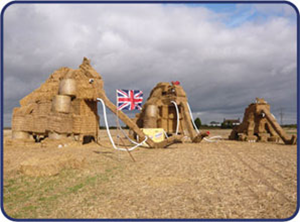For these guys, it started with Weeatabix.
Well, not really. Weeatabix is some kind of British cereal [and why is it that so many of the cereals from the olden days sound like some kind of mechanical invention or cleaning product? I mean, Weeatabix? Shreddies? Ruskets? I somehow imagine robots. But I digress. Badly.] that looks like hay bales, and as every company in the world seems to do, they had a contest — in this case, it was a straw (hay) bale contest, in support of British farming. £5000 went to the winning farm, and basically all they had to do was create art.
These mammoths are the winning design by farm folk Nikki and Paul Grant and David Sharpe, and were a big hit for obvious reasons. They won the money, and celebrated, I’m sure, and that will probably be a great story they can dine out on for years.
People frequently ask me how I come up with ideas for stories. Truthfully, it’s a question that gets posed to every author, and I will join the chorus in saying that I don’t really know. A lot of stuff churns through the subconscious and leaks out in dreams, but few of those ideas ever hold up to the rigorous light of day and the process of writing and revising (okay, that worked for Stephanie Meyers, but I’d have to ask what she’d been eating before going to bed). I have a suspicion that everyday life is what gives writers most of their fodder. Like Nikki Grant’s mother, who found the whole Weetabix art contest inspiring. She’s now written a children’s book about Mambo the Mammoth. (For obvious reasons he can’t be Manny, though he looks a lot like the Ice Age cartoon character.)
Mambo has a Facebook page, even.
Sometimes just being on the sidelines while something happens is enough to fan a creative spark. Wonder what that spark will be for you?
Some of the titles of the books just now on my coffee table/trunk: The Rebellious Century, 1830-1930, by Charles Tilly, The Arsenic Century: How Victorian Britain was poisoned at home, work, and play, by James C. Whorton, Healers and Healing in Early Modern Italy, by David Gentilcore, and on reserve Poison, detection, and the Victorian imagination, by Ian Blumney,
Oh, but this is way too much fun. If you can get your hands on a copy of The Arsenic Century, do. It’s one of the most engaging nonfiction reads I’ve dug into in awhile. Fun, fun, fun, and all in the name of work! Woot!
I love my job.


Great images and contest. Married to a country boy as I am, I’m surprised I haven’t heard of such contests and prizes before now.
Your non-fiction titles scare me, I must admit. You are very brave. Fun? Fun?
only Patrick’s mother doubtless knew how to spell here as hear when called for.
Here’s a joke Patrick’s mother used to tell–“Did you ever here what happened to the old lady who sat on a razor blade? She died of arsenic poisoning.”
(Patrick doesn’t think I need to explain. But let me know if I do.) This is probably a genuine late Victorian joke, as his mum was born in 1914, and perhaps learned it from her Mama….
Darling Charlotte.
You’ll have to explain this one. (Poor Patrick thought I was smarter, eh? No such luck.)
Oh, dreams. The sleeping ones are a bit crazy-funny, but the waking ones are sometimes productive. I think the reason I’m so reluctant to write down the story in my head is the concern that it will wilt.
I’m really enjoying Firebirds Soaring, by the way. I am savoring it, and read a story or two before bed. The thing about short stories is that I want them to stay. I get involved in a character’s life, and then all too soon it’s as if the train stop has arrived before I’m ready to say goodbye.
I’m so glad you like it! I have that same love-hate pull with short stories. I never want ANY story to end, which does make me wish everything were a really, really long novel… however, I think it’s good practice at brevity to keep attempting to write them, so I do.
I love waking dreams, but it really requires lying in bed for a good deal of time before I have any – and I feel guilty about the lazing about, so they don’t often happen. But they can really be quite productive, incidentally.
You must read “The Alto Wore Tweed”–it involves oleander and a wooden cross. And I shall leave the plot alone there!
Okay, there’s that poison thing again. You are definitely having too much fun. I worry about the vegetables you eat. 🙁
I AM eating my vegetables!
Just… enjoying my arsenic as well!